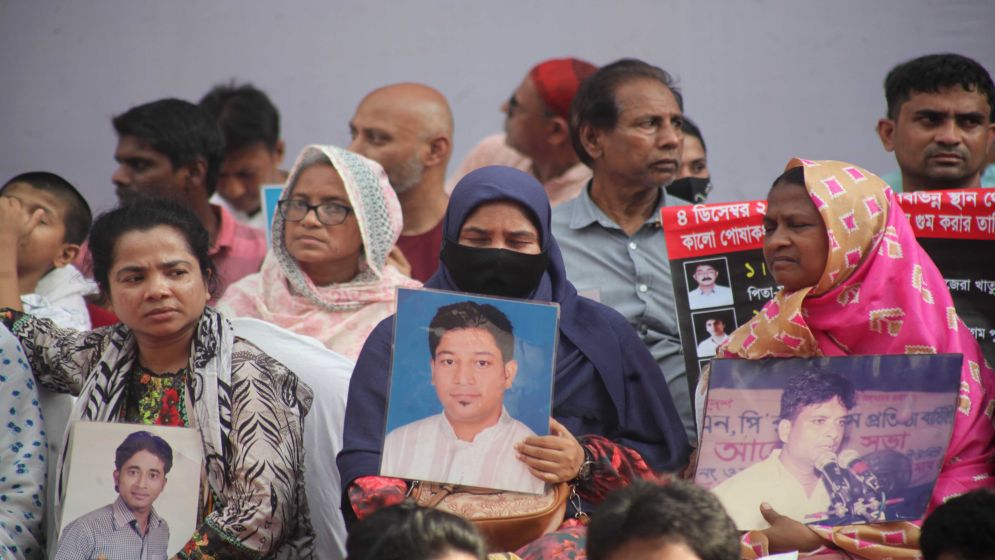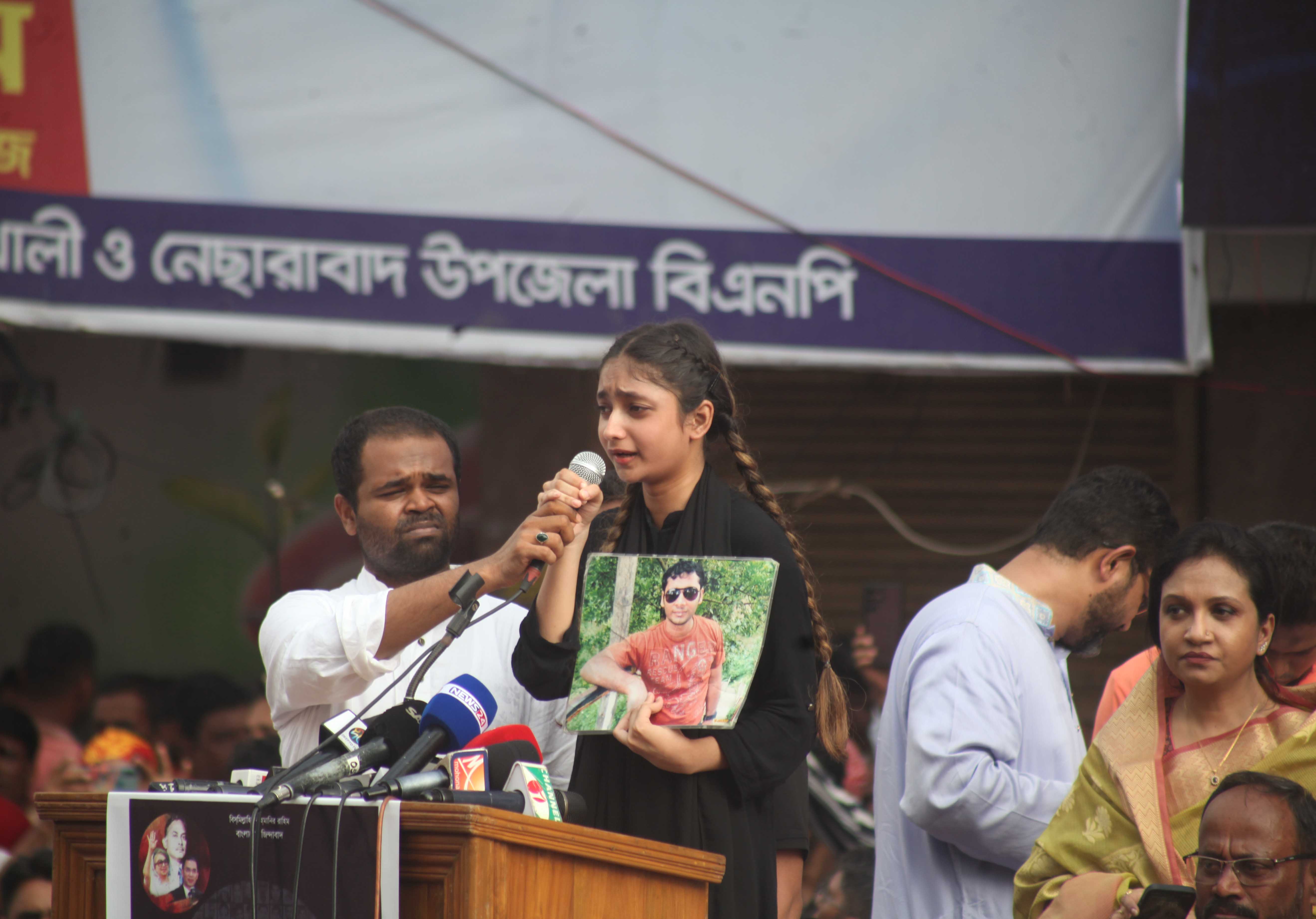"Ma, they are beating me": Last words of a forcibly disappeared person to the family

Photo Credit: Nazmul Islam
Ayesha Begum's heart still aches from the chilling 23-second phone call from her son, Abdul Kader Masum, on December 4, 2013.
His words, "Mom, they have beaten me badly. I am not okay," followed by the abrupt disconnection, remains etched in her memory. Masum was forcibly disappeared that day, and his absence has left a gaping wound in Ayesha's life.
On Friday (August 30)-observed globally as the International Day of the Disappeared– Ayesha's poignant question echoed amidst the gathering at the Central Shaheed Minar:
"The country has gained independence again, but my son has still not returned home. Has the country not been liberated for my son Masum?"
As she spoke, tears streamed down her face, reflecting the profound sorrow of a mother's unending wait. Organized by Mayer Daak (Mother's Call), the human chain saw an outpouring of support from diverse groups, united in their condemnation of enforced disappearances and extrajudicial killings.
From human rights activists to politicians, lawyers, and families of the disappeared, the event served as a somber reminder of the countless lives stolen and the enduring pain of those left behind.
Masum's photo, clutched tightly by his mother, became a powerful symbol of this ongoing struggle for justice and accountability.
Over 30 individuals, many clutching photographs of missing loved ones, shared their stories and demands for justice and transparency during the three-hour program. Like Ayesha, many were sharing their heartbreaking stories.
Sanjida Islam Tuli, coordinator of Mayer Daak, emphasized the ongoing struggle for answers: "Even though Sheikh Hasina fled on August 5, the forces responsible for these disappearances remain. Families are still waiting for information about their loved ones."

Hasina’s reign of terror
Families of the disappeared have long alleged that those with dissenting views were targeted. Many believe their loved ones were held in a secret prison known as 'Aynaghar.' The interim government, however, has remained silent on the issue.
Michael Chamka, a survivor of enforced disappearance, shared his harrowing experience at the event. "On April 8, 2019, I was abducted by seven plainclothes men from Kalyanpur, Dhaka. After five years in Aynaghar, I was finally released when the Hasina government had fallen.”
Michael termed these disappearances as a tool of fear. “The government could keep people hidden for months. I understand the pain of those crying here. The secret prisons, the 'Aynaghars,' must be shut down. If writers, poets, and artists don't speak out, these atrocities will continue," he said.
The impact of enforced disappearances on families was painfully evident. Sajedul Islam Sumon was taken in 2013, leaving behind two young daughters.
Hafsa, then in fourth grade, is now a first-year Honors student. Aroya, just a toddler at the time, is in sixth grade. Their lives have been irrevocably shaped by their father's absence.
At the human chain, Hafsa Islam said, “I have some memories of my father, but my younger sister continues to cry for him. Aroya has only known him through his photographs.”
Hafsa said now she realizes that her father disappeared because of his affiliation with the BNP, and there is no trace of him. “We demand justice for his disappearance. Those responsible for his abduction should be arrested and held accountable under the law. This is our demand.”
Anika Islam Isha, daughter of the missing Ismail Hossain, shared, “My father has been kept from us. My younger brother waits every day, hoping our father will come back. Sometimes he questions why our father doesn’t return.”
“We feel helpless after losing our father; we want him back and seek answers to my brother's questions. We need to know what has happened to our father,” she added.
Lamia, whose father Kausar Hossain was forcibly disappeared, also expressed her longing for her father and the pain of growing up without him. She has been demanding his return for 11 years, emphasizing that their only desire is to have him back.
Former diplomat Maroof Zaman, who himself was a victim of enforced disappearance, recounted the harrowing experience which put him into the secret prison for more than two years.
“On December 4, 2017, I was abducted at gunpoint and for the next two years I was put inside Aynaghar,” said Maroof, “I lived in hell for those long two years.”
“We urge the interim government’s commission to expedite justice for all cases of enforced disappearance. It is essential to identify the entire state machinery involved,” urged Maroof Zaman.
-66d203484c434.jpg)
White paper on enforced disappearances
Mahmudur Rahman Manna, convener of the Citizens' Unity, has called for a clear statement and a white paper on the matter at the human chain.
"We must confront the past to build a better future," he stated. "The police brutality under the previous government was unimaginable. I was forcibly disappeared for 23 hours and spent two months in jail. I witnessed countless horrors."
Manna acknowledged the work of organizations like Mayer Daak in documenting disappearances, stating their lists are likely 95% accurate. He also highlighted the need for justice for those killed in July, potentially numbering over a thousand.
"We must reach out to the victims of enforced disappearances and extrajudicial killings," Manna urged. "The government must also take action. To build the humane Bangladesh we envision, we must include everyone."
Human rights activist Syed Abdullah highlighted the ineffectiveness of many human rights organizations, stating that their failure to address the suffering of families like Lamia's undermines their credibility.
Senior lawyer Sara Hossain argued that the absence of the term "disappearance" in legal documents does not preclude justice, although she noted the lack of intervention from higher courts on this matter.
Saiful Haque, a leader of the Revolutionary Workers Party, expressed gratitude for the signing of the international convention against enforced disappearances but emphasized that an investigation committee alone is insufficient.
He called for holding those responsible accountable under the law and ensuring the return of disappeared individuals to their families, stressing the urgency of the issue.
—

